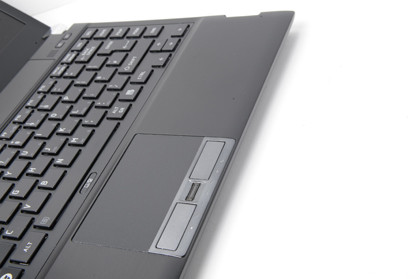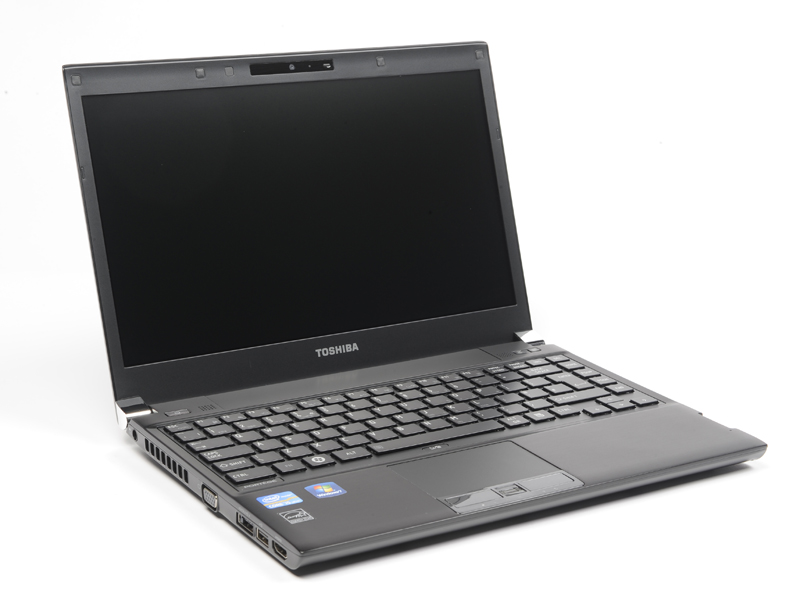TechRadar Verdict
Pros
- +
Good office performance
- +
Decent battery life
- +
Very thin and light
Cons
- -
Very high price
- -
Some flex in chassis
- -
Pre-loaded software
Why you can trust TechRadar
We had to pick up our jaws up from off the floor too. It's going to take a damn sight more than a sophisticated-sounding French moniker to distract you from this laptop's gargantuan price. But the Toshiba Portege R830 must be an astonishing piece of kit, right?
Designed for the busy executive who wants a laptop that doesn't interfere with the shape of a soft Italian leather briefcase, Toshiba's wafer thin Portégé R series has long been one of the standards to beat when it comes to building a thin and light laptop.
Weighing less than 1.5kg, this Toshiba still packs a high clockspeed CPU beneath its demure black casing, and promises much in the way of business enhancements for the busy traveller. Thanks to that quick Core i5, it beats all but the quad core in the Acer 8951G in productivity benchmarks, and weighs well under half of that monster's tonnage.
How does it compare to the Core i7 in the Zenbook? That chip has a lower overall power draw and an extra megabyte of memory, which shows up best in the gaming benchmarks – but for general use the Core i5 here is oddly a little bit better.
TechRadar Labs

Battery Eater '05: 271 minutes
Cinebench: 10747
3DMark 2006: 3752
Battery life is more impressive. Running for just over four-and-a-half hours in our stock test, which includes a looping HD video, you can eke out up to eight hours of run time with a bit of care – that's a full day at the office, which you could spend at the coffee shop instead.
How much?

The problem that Toshiba faces is the arrival of the Ultrabook, in this case a role played by Asus' Zenbook UX31. Where once 'thin' and 'light' commanded a premium in the market for their cleverly engineered heatsinks, the UX31 is an even lighter and – in some respects, like instant start up – more capable machine for a third less cash.
To make matters worse, the magnesium alloy with which Toshiba coats the Portégé R580-138 may help to keep the weight down, but you'd be forgiven it's a cheap plastic rather than a metallic shell. It's soft, it flexes to the touch and it doesn't feel like it offers much protection next to the deadly corners of the Zenbook.
There are some advantages to the Portégé. It has a better screen, for example – there's a slight blue colour cast and an overly bright backlight, but these are both easy to tune out in the settings. You also have easier access to the underside for upgrades and changing the battery.
But despite its future-friendly Sandy Bridge CPU, the Toshiba leaves the distinct impression of being very 'last-gen' thin and light. Yes, you can carry it in one hand, but there's very little on offer that an Ultrabook doesn't do better.
Unless you count the incredible amount of pre-installed software, most of which simply raises the question: why? There are peculiar application choices. Like the games market, Amazon and eBay apps – they have no business on what is ostensibly a very sensible corporate machine, and give the Portege a slightly confused identity. You can remove them, of course, but they shouldn't have been there in the first place.
What we're really looking for is a reason to buy this over the cheaper, faster Zenbook. So far we have larger hard drive and a built-in DVD player, and Toshiba's support options are good if you want a business critical device and service. But it isn't enough any more; not at this colossal price.
Follow TechRadar Reviews on Twitter: http://twitter.com/techradarreview
